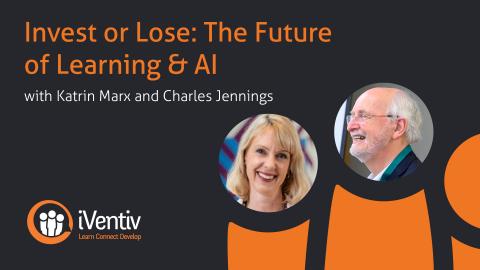Submitted by networkadmin on
By Gorana Sandric, Former Head of Group Talent Development, Coca-Cola HBC
I am starting this year with well-being in mind, to be sensitive to my needs and to the needs of others: I will work on my balance, flow, and reciprocity.
I recently chaired Talent Management Europe, charmed by knowing how iVentiv is running the ‘show’. The Chairwoman role requires adaptability, spontaneity, and being in the flow, quite the opposite of the skills I was asked to demonstrate as a leader during my corporate service.
The event was a mix of ‘golden nuggets’ on the relevant topics shared by participants and numerous networking opportunities. The iVentiv setup creates an ecosystem of experience, practices, knowledge, and support mechanisms. This is not the first iVentiv event I have chaired and I dare say that what remains after each conference is the strength and interaction of the network.
‘Go where the energy is’
If there would be a tagline of the event, this is the title that would take my vote. How to overcome resistance of the individuals whose jobs are soon to be significantly transformed to engage in upskilling? How to implement a Talent Marketplace if everyone is not onboard?
It’s not easy to convince the whole organization about a Talent Marketplace. Nowadays, a ‘solution for most HR or Talent challenges’ is a worthwhile investment of leaders’ time. A specific piece of advice we heard several times during the event was to ‘go where the energy is’.
The onset of Industry 4.0 is already started to impact jobs, introducing a higher level of automation and urging companies to manage the transition of their workforce to remain employable and skilled for the new requirements. This transition holds several benefits if the organization prepares for it, and one of the requirements is to sharpen the focus and span of activities of our leaders and the system. Less is sometimes more and simple does not mean shallow.
How can you prepare your organisation for Industry 4.0?
I’m calling for a Strategic People Plan, with a clear purpose: build a targeted and focused set of interventions on the individual, team and system level that prepares the organization and its members for the impact of Industry 4.0 on their roles, jobs and skills.
Upskilling and reskilling is a part of it, but without holistically seeing the impact on the whole system, it will not create the desired outcomes.
What if you are challenged while introducing a new initiative and it seems impossible to mobilize the whole organization? What if you are faced with the organizational or leaders’ limited beliefs and an ‘old fashion style’?
No need to back off, go where the energy is, test it, adopt it and scale it up.
Does Talent Management institutionalize discrimination?
No worries, this was not a topic on the agenda: it is purely my conclusion. I allow myself to be a critic in the area I love, speaking from my own experience as a corporate citizen and, more recently, as an entrepreneur.
What would happen in your organization if someone said to the boss that they are struggling with mental health challenges? Where would they land in the next ‘boxing’ exercise during a Talent review (assuming that the organization is still using talent boxes)? I call the outcome of a Talent review ‘Boxing’. In simple terms, because they place employees in a matrix (or ‘boxes’).
I also want to research the link between mental health and the impact triggered by our ‘beloved’ Talent review, or the Performance Management cycles we force on individuals. We design the processes with the best intention and purpose, wanting to be fair and transparent.
In the past maybe it was not trendy to take into account the kind of criteria as the impact on the employees’ wellbeing. Maybe at some moment in time, such practices were helping leaders to manage, attract and retain their team members.
How do you create inclusive leadership?
How do we help leaders lead in today’s world? How do we help them hold meaningful conversations and remain curious, humble, creating a psychologically safe environment?
I recently read the following quote from Henry Mintzberg: ‘I don’t want to be a Human Resource, I want to be a Human Being’. It has so much truth in it and I feel that nothing else needs to be said.
This situation calls for inclusive leadership, especially to face the challenges of the future workforce: the most diverse ever and at the same time a rapidly shrinking workforce. Leaders need to be able to navigate the paradox of contrasting needs within their teams, ensuring wellbeing and outstanding performance.
We, Talent leaders, should embrace the change and democratize the processes to ensure that leaders are enabled to lead humans and not machines.
As a final thought, I place this question for you all: To what extent does the Performance Management process or Talent reviews enable leaders to hold performance and career conversations with an individual who may currently be struggling with mental health challenges?
Is it a Great Resignation, a Great Rotation, or a Great Renewal?
Another buzzword everyone talks about is the ‘Great Resignation’. I think it is relevant to create those buzzwords, so I need to familiarize myself or, otherwise, I risk looking as if I am not UpToDate.
The last networking session in the event I was chairing made a great impact on many of us. I ended up concluding that I was simply ‘brainwashed’ with a perspective that someone offered and about which I had not reflected critically enough.
I wonder if there is a need for other perspectives on few more buzzwords. Dramatic buzzwords are catchier, or able to mobilize us to avoid the ‘awful future that is coming’ unless we act upon it. Like the renowned ‘War for Talent’, for example.
What if I offer another perspective: most of the talent shortages you face (if you do) are self-inflicted by exclusive talent management, by being obsessed with overinflated profiles (profiles with unreasonably high expectations related to experience, knowledge, years of service, etc). There are organizations and leaders that overly rely on ‘buying’ skills, not knowing nor tapping enough into the capacity to develop their current workforce.
Coming back to the diverse and shrinking workforce, what are the ‘hidden talent pools’ of candidates that we do not yet have in the perspective because we were focused to win a few side battles in the war for talent. A change of perspective might help us avoid the war in the first place.
I love the idea of creating a variety of ecosystems, there is a positive inspiration in it.
If only I would more often push myself out of the comfort zone of the buzzword someone serves… Do you feel that energy if you change only one word: from Great Resignation to Great Renewal? Or from Great Resignation to Great Rotation?
It was an honour being the Chairwoman of the Talent Management Europe event in January, having such an amazing learning opportunity. I am chairing the same event in May and I do hope to meet many of you there.
Gorana Sandric is the former Head of Group Talent Development for the Coca-Cola Hellenic Bottling Company and a HR Leadership Development Consultant and Executive Coach. Her focus areas are Strategic People Planning, and L&D with the outcome to increasing inclusive environments, boosting entrepreneurial mindsets, and Talent Management strategy. If you're a Global Head of Talent, you can join Gorana and others at the next Talent Management Europe. Executive Knowledge Exchange for free.











